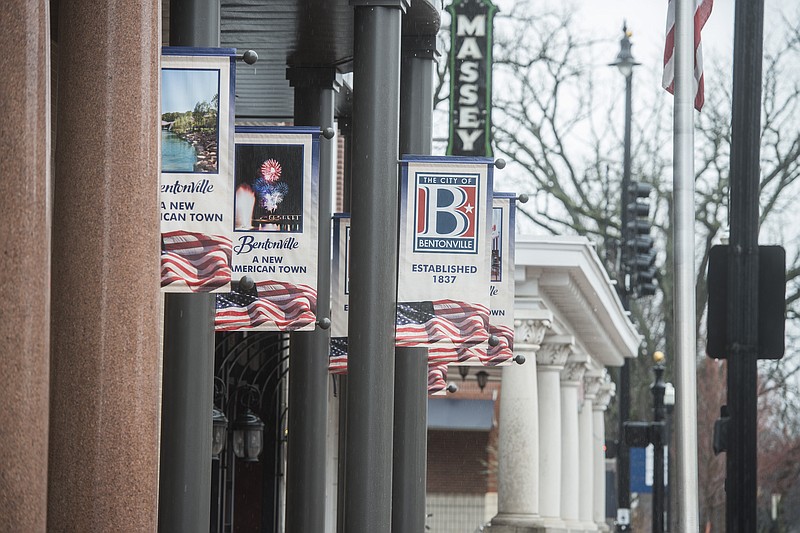BENTONVILLE -- The city plans to increase fees it charges developers to help offset the rising demand for services new buildings and residents bring.
The increase will mean a higher cost to live and do business in the city, according to one City Council member.
Building permit fees
Under fees that take effect July 1, a project with a value of $50,001 to $100,000 would have a permit cost increase from $260 to $330 for the first $50,000 plus $4 for each additional $1,000.
Those with values from $100,001 to $500,000 would increase from $460 to $580 for the first $100,000 plus $3 for each additional $1,000. Those with a value of $500,001 or more would increase from $1,660 to $2,120 for the first $500,000 plus $2 for each additional $1,000.
For comparison, a $200,000 house would require a $880 building permit in Bentonville. A similar house would require a $784 building permit in Springdale, $760 in Rogers and $760 in Fayetteville.
Source: Staff report
Thirteen of the city's departments will see changes. Notable changes include an increase in the building permit base fee and new fire department fees. All changes will go into effect July 1.
The increases will allow the city to recover the costs for the services associated with the individual items on the fee schedule, said Shelli Kerr, interim community and economic development director.
The city issued nearly twice as many residential building permits in 2017 as it did in 2010 -- 1,086 and 553 respectively. Commercial permits increased about 33 percent from 119 to 178 during the period.
One of the largest changes in the city's fee schedule was a 25 percent increase to the base fee for building permits with an estimated value of more than $50,000. The largest base fee is $2,120 for projects with an estimated value more than $500,000.
Bentonville uses International Code Council data, which provides an average construction cost per square foot, to determine the value of a building. That value is then used to calculate permit fees.
The increase was determined by the change in cost of living since the last time the fees were changed, which was 25 percent, Kerr said. The last major update was 13 years ago.
The July fee increases are separate from the city's impact fee. The impact fee is a onetime charge to developers to pay for growth-related city services and infrastructure. The fees are collected before the city issues a certificate of occupancy for a new home or building. State law requires the money must be used for capital projects related to growth and must be used within seven years.
The City Council approved the latest changes in February. Council member Bill Burckart voted against the changes. Council member Stephanie Orman abstained.
Orman's employer, McLarty Daniel Automotive, has a development project going through the Planning Department, and the fees may affect it because of the project's timeline, she said.
"I just felt like it wasn't appropriate for me to vote on that," she said.
The increase of construction costs trickles down to the citizens who will live in residential developments and the consumers who buy goods and services in commercial projects, Burckart, who also is owner of Burckart Construction, said in a recent phone interview.
There is a growing need for affordable housing in the city, and these increases may only exacerbate the problem, he said.
The average cost of a single-family home in Bentonville at the end of last year was $259,077, according to Mervin Jebaraj, director for the Center for Business and Economic Research at the University of Arkansas.
The cost of a house shouldn't be more than 2½ to three times the household income, he said. Bentonville's average household income was $98,239 at the end of last year.
Burckart also said some departments' revenue are exceeding expenses, pointing to building inspection expenses of $750,000 while revenue was nearly $1.2 million last year.
He's commended city staff on their work as the load increases with city growth and has suggested council and city administration consider adding staff to help with building permits and inspection paperwork.
"If we have that additional revenue that's well over budget, what is the necessity to raise the cost if the needs are already met with the surpluses you have currently?" he said.
The new fee schedule also includes changes in several other development requirements, including electric, mechanical and plumbing, all affecting the total permitting cost for a project.
The Fire Department added several fees associated with new construction. The department didn't charge fees for services associated with the fire marshal's office until the rapid city growth over the past five years had the office devoting nearly all of its resources to new development, said Jake Feemster, assistant fire marshal.
"This is an attempt at cost recovery," he said.
Eight permit fees related to construction were added to the fee schedule for the Fire Department. Several are a flat fee of $58 for tasks like a sprinkler system on a remodeled building or fire alarm modifications to an existing building.
Others vary in cost depending on the project size. A sprinkler system permit for a newly constructed building would cost 5 cents per square foot for developments larger than 50,000 square feet.
The fire marshal's office would spend five to six hours a week on new construction when the city had a population of 18,000. It now spends close to 80 hours a week on new development, Feemster said. Off-duty firefighters who are also trained as fire inspectors are currently helping with fire marshal office duties.
Other services such as fire investigations, public outreach and inspections of existing buildings are limited because there's so much new development that needs attention, Feemster said.
NW News on 04/30/2018

